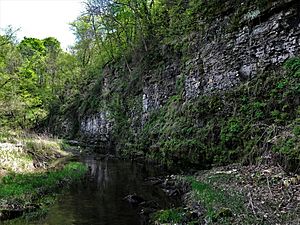Algific talus slope facts for kids

Algific talus slopes are very special and rare places. They are unique ecosystems where cold air escapes from underground. These slopes are mostly found in the Driftless Area of Minnesota, Wisconsin, Illinois, and Iowa. Some have also been found in the Allegheny Mountains of West Virginia. These areas are like natural refrigerators, creating a cool, damp home for unusual plants and animals.
Contents
What Are Algific Talus Slopes?
The word algific means "cold producing." A "talus slope" is a pile of broken rocks that have fallen from a cliff. So, an algific talus slope is a rocky hillside that produces cold air. These special places were first described in the early 1980s.
They can only exist in areas with karst topography. This means the ground has sinkholes and underground caves. The rocks are often crumbly and have many cracks.
How Do They Stay Cold?
Algific talus slopes have a unique natural air conditioning system.
- In summer, warm air goes into sinkholes at the top of a ridge.
- This air travels into underground ice caves, where it cools down.
- The now-cold air then flows out onto the algific slope.
- The temperature on these slopes stays cool, usually between 30 and 55 degrees Fahrenheit, from spring to fall.
In winter, the air flow reverses. Cold air is pulled into the slopes and turns water in the caves into ice. This process keeps the caves icy, ready to cool the air again in summer.
A Cool Home for Rare Plants and Animals
Because of the constant cool and moist air, algific talus slopes create a special environment. It's like having a small piece of a northern forest, similar to those near the Canada–US border, right in the middle of these states.
This allows rare plants and animals to live there. You might find ferns, mosses, liverworts, and evergreen plants like Canada yew and balsam fir. Trees like birch, basswood, and sugar maple also grow here.
Where Are They Found?
Most algific talus slopes are in the Driftless Area. This region was not covered by glaciers during the last Ice Age. In Wisconsin, they are found near the Mississippi River in western Grant County.
Many of these special sites are kept secret from the public. This helps protect them from damage. However, you can visit Bixby State Preserve in southwestern Clayton County, Iowa, to see an example of an algific talus slope.
Protecting Rare Species
Algific talus slopes are very important for protecting endangered species.
- The Iowa Pleistocene Snail was thought to be extinct. But it was found living on these slopes in Iowa in 1955!
- To protect this snail and other rare species, the Driftless Area National Wildlife Refuge was created in 1989.
- The Northern monkshood is another threatened wildflower. It grows in the Driftless Area and also in New York State. It also receives special protection.
These efforts help make sure these unique plants and animals can survive in their special cold homes.
See Also
 | Kyle Baker |
 | Joseph Yoakum |
 | Laura Wheeler Waring |
 | Henry Ossawa Tanner |

